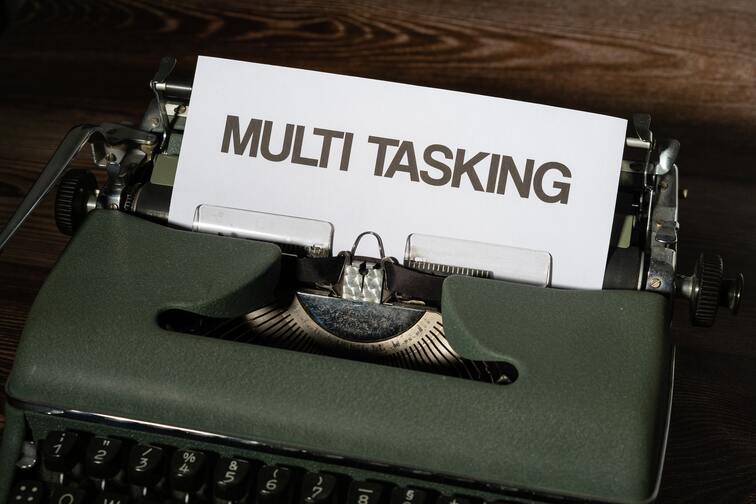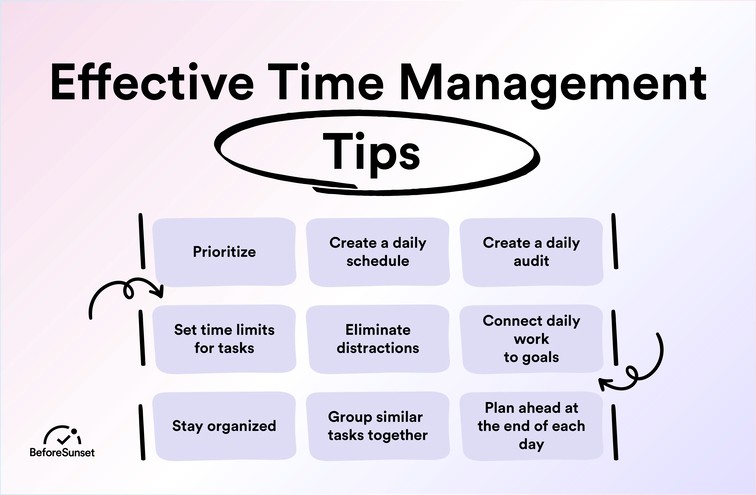The ability to manage your time well is crucial for success and productivity in both your personal and professional life. It might be difficult to effectively manage one's workload when there are so many demands and obligations, and it's simple to become anxious and overwhelmed.
Yet, by using the appropriate methods and strategies, you can take charge of your time and boost your productivity, which will eventually result in greater results and less stress. We'll look at some practical time-management advice in this post so you can efficiently handle your responsibilities.
These suggestions can assist you in prioritizing your duties, reducing distractions, and improving your overall efficiency, whether you're a student, professional, or just someone who wants to make the most of your time. So let's get started and learn how to manage your workload expertly!

The Benefits of Time Management
For both personal and professional success and stress reduction, effective time management is essential. Effective time management enables people to create priorities, realistic objectives, and deadlines. As a result, there is an increase in output, improved results, and a sense of success, all of which can boost one's confidence and self-esteem.
By allocating time for leisure and relaxation, those who are effective time managers may also prevent overworking themselves and burning out. Also, it aids people in preserving a healthy work-life balance by enabling them to spend time with friends and family, pursue interests and hobbies, and live a healthy lifestyle.
Implications of Poor Time Management
Time management issues may have a serious detrimental impact on people's lives and careers. Tasks may take longer to complete, deadlines may be missed, and the quality of work may decrease when time is not handled well.
When people are spending more time on tasks and maybe having to redo work as a consequence of errors or blunders, this can lead to a drop in productivity. Ineffective time management can also raise stress and anxiety because people may feel overworked and find it difficult to balance their personal and professional lives.
However, if people consistently miss deadlines, arrive late, or are unavailable, it can harm relationships with coworkers, clients, and family members.
Time Management Tips To Make The Most Of Your Time
Good time management is critical for personal and professional success and stress reduction. With so many demands and diversions, though, it may be difficult to manage time properly and optimize productivity. Thankfully, there are a variety of time management tips and practices available to help people make the most of their time.
Individuals may prioritize activities, boost efficiency, and achieve their objectives by applying these tactics while maintaining a good work-life balance. In this post, we will look at some of the greatest time management tips and practices that people can use to better manage their time.
These time management tips can help you optimize your time and reach your maximum potential whether you are a student, professional, or simply someone trying to enhance your time management skills. So let's get started and learn how to make the most of your time!

Prioritize
Setting priorities is a crucial skill for efficient time management. Individuals may focus on what is vital and urgent by prioritizing work, ensuring that they fulfill deadlines and succeed in their objectives.
Prioritization begins with defining short- and long-term goals, which enables people to decide which actions are necessary to accomplish their goals. Focusing on high-priority chores is made easier by making a to-do list and organizing tasks according to significance and urgency.
People can avoid feeling overwhelmed and advance toward finishing a task by breaking huge tasks down into smaller, more doable activities. People may avoid overcommitting and preserve a good work-life balance by learning to say no to things that are not vital or urgent.
Create a daily schedule—and stick with it
Creating a daily schedule is a great way to maximize productivity and manage time effectively. By planning the day in advance, individuals can allocate time for each task, ensuring that they complete their work efficiently and on time.
To create a daily schedule, start by making a to-do list of all the tasks that need to be completed. Prioritize the tasks according to their importance and urgency, and schedule the high-priority tasks first. It's important to allocate breaks between tasks to rest and recharge, which can help increase focus and avoid burnout.
When creating a schedule, it's crucial to set realistic time frames for each task and avoid overcommitting. Once a schedule is created, stick with it as much as possible. If something unexpected arises, it's okay to adjust the schedule, but it's important to return to the original schedule as soon as possible.
Create a time audit
By gaining a knowledge of how much time is spent on various tasks, a time audit is a useful tool for improving time management skills. People might begin by keeping track of their daily activities, including work-related chores, personal tasks, and leisure activities, to construct a time audit.
A time-tracking tool may be used for this, or you can just write down the beginning and ending timings of each activity in a notepad. When activities are recorded, people may arrange them into several categories to determine how much time is spent on each action. People can find areas where they may be squandering time and change their behaviors by assessing the time spent on various activities.
This can assist boost productivity and guarantee that time is spent on projects that are of the utmost importance. Finding extra time for leisure and self-care activities, which are essential for keeping a healthy work-life balance, may also be accomplished with the use of a time audit.

Set time limits for tasks
Establishing time limitations for projects and doing them within that limits are good time management strategies. People are more likely to concentrate on the work at hand and avoid becoming sidetracked by other activities when they establish time limitations for assignments.
This can assist people in finishing activities quickly and avoiding procrastination. Individuals can dedicate more time to high-priority work by setting time limitations to prevent wasting too much time on low-priority chores.
Setting realistic time constraints for each activity is essential, and it's best to avoid overcommitting as this can result in burnout and lower productivity.
Figure out how you're currently spending your time
Knowing how time is presently being spent is crucial for improving time management. Tracking activities throughout the day with a time-tracking app or manually recording the beginning and ending timings of each action is one approach to this.
Following the tracking of the activities, people might put them into other categories, such as work-related duties, personal chores, and leisure activities. People can discover areas where they may be squandering time and change their behaviors by examining how their time is presently being spent.
For instance, people could discover that they spend too much time watching TV or on social media and change their routines to devote more time to high-priority projects. The first step to improving time management and productivity is to understand how time is presently being spent.
Eliminate distractions
One of the major barriers to efficient time management is distractions. Distractions, such as checking social media, answering emails, or chit-chatting with coworkers, may easily mount up and consume important time.
It's critical to recognize and get rid of distractions in order to effectively manage your time. Making a distraction-free workspace, disabling device notifications, and setting aside time to read emails and texts may all help with this. Also, it's critical to convey to family members and employees the value of uninterrupted work time.
Distractions must be removed in order for people to remain concentrated and work more quickly. This may aid in boosting output and lowering stress levels, resulting in a more rewarding and well-balanced professional and personal life.
Connect daily work to goals
An efficient strategy to better manage time and succeed is to link everyday work to long-term objectives. People may prioritize their daily duties and make sure that their efforts are in line with their goals when they have a clear grasp of their aims.
Individuals may maintain motivation and concentrate on the big picture even in the face of failures or difficulties by linking everyday work to goals. Setting precise, quantifiable, and doable goals and then breaking them down into manageable daily tasks can help you link your work each day to your goals.
This can assist people in keeping track of their advancement and pursuing their objectives.

Stay organized
Being organized is essential for improving time management and productivity. People are better able to manage their time wisely and finish projects quickly when their workplace and schedule are structured.
People can use a task management application or make a to-do list to prioritize work and keep track of deadlines in order to stay organized. Workspaces should be cleared of clutter, and everything should have a home.
People may save time by doing this instead of wasting it seeking for things or papers. Also, people may organize their days and stay away from overcommitting to work by using time-management tools like calendars or scheduling applications.
Group similar tasks together
Organizing comparable jobs into groups is a practical time-management strategy that can aid people in completing work quickly and effectively. People can use the energy and attention generated by finishing one activity to apply to the next one by grouping related tasks together.
For instance, it is more effective to complete all of the email answers at once rather than pausing and restarting the activity several times during the day if someone has to react to emails. Organizing comparable jobs into groups also reduces the mental effort needed to transition between various tasks, which can enhance focus and productivity.
Build unstructured time into your schedule
Although it can seem paradoxical, including unstructured time in a plan might really aid people in time management. Unstructured time promotes flexibility and offers chances to deal with any unforeseen chores or problems that may come up.
Also, it enables people to take quick pauses and refuel, which can improve concentration and productivity. To prevent unstructured time from becoming a waste of time, it's crucial to establish limits for it.
People can, for instance, choose a time restriction for breaks and make sure to spend that time to do something they like or find pleasant.
Plan ahead at the end of each day
The best method to effectively manage time and be ready for the following day is to plan ahead at the conclusion of each day. People may prioritize their responsibilities and get started right away the next day at work by taking a few minutes at the end of the day to assess what was completed and prepare for the following day.
This may lessen stress and boost productivity. Preparing ahead enables people to foresee any future barriers or blockages and develop a plan to overcome them before they become greater issues.

Stop trying to multitask
In spite of research demonstrating that trying to do many activities at once reduces productivity, increases stress, and increases the likelihood of making mistakes, multitasking has been hailed as a way to get more done in less time.
By focusing on a single activity at a time, rather than juggling several, people may more efficiently use their time. By eliminating distractions, this approach might lead to improved output in less time. If one is able to concentrate on one work at a time, they are less likely to be sidetracked and will likely do a better job. Increased productivity and decreased stress are well worth the effort of self-control that may be required to avoid multitasking.
Say “no” or delegate
Saying "no" or delegating tasks can be an effective way to manage time better and reduce overload. It's important, to be honest about what can be realistically accomplished in the given time frame and to avoid taking on more tasks than can be handled. Sometimes it may be necessary to turn down requests or delegate tasks to someone else.
Delegating tasks can be an effective way to free up time for more important tasks and to ensure that tasks are completed by someone with the necessary skills and expertise. Saying "no" or delegating tasks can be difficult, but it's an important skill to master to prevent burnout and manage time more effectively.
Do the most important tasks in the morning
Starting the day by doing the most important tasks is an effective time management strategy. Our energy and focus levels are usually highest in the morning, making it an ideal time to tackle tasks that require more concentration and effort.
Completing the most important tasks first thing in the morning can also help to reduce stress and increase productivity for the rest of the day. By prioritizing the most important tasks and completing them early, individuals can avoid the stress of rushing to complete them later in the day or missing deadlines.
Additionally, starting the day with a sense of accomplishment can boost motivation and provide a positive momentum for the rest of the day.
Ditch handwritten to-dos—use a tool
To-do lists and task management software may be useful tools for time management. A concentrated area for organizing activities may be provided by digital solutions like productivity applications and software, making it simpler to prioritize, monitor progress, and create reminders.
Digital tools can also offer extra features like collaboration and calendar and email integration. By adopting a digital application, people can readily access and update their lists from anywhere and lessen the chance of missing or forgetting critical activities.
Digital solutions may also offer insightful information on how time is spent, making it simpler to pinpoint areas that need improvement and enhance time management. Helpful for not one task but for all tasks.

Take breaks regularly
Taking frequent breaks is a crucial component of time management success. Although it may seem contradictory, taking breaks can actually stay focused and boosts productivity. People may revitalize their bodies and brains by taking little pauses throughout the day, which will enable them to return to their duties with new vigor and clarity.
Taking pauses between each task can also aid in lowering stress and avoiding burnout, which can have a detrimental effect on productivity and general well-being. It's crucial to take pauses that are long enough to offer a physical and mental respite but brief enough to prevent interfering with workflow.
Work on quick tasks in between meetings or focus time
Best time management tips include working on brief activities in between meetings or during the focused time. When the day is packed with meetings and more significant duties, it might be difficult to find time for quick, low-importance jobs.
Yet, utilizing the time you stay focused or intervals between meetings might be a productive strategy to do these chores. People may maximize their time and lessen the chance of jobs building up by concentrating on quick things during these times. Also, finishing simple activities may boost confidence and keep you moving forward throughout the day.
Making ensuring that the activities being accomplished are quick and low priority while not detracting from the completion of more crucial duties is critical.
Go beyond a never-ending to-do list, take control of your time
Good time management skills are about more than just creating a never-ending to-do list. It's about taking control of your time and being intentional about how you use it when doing the said to-do list. This means prioritizing tasks based on their importance and urgency, setting clear goals and deadlines, and being proactive about managing distractions and interruptions.
It also means taking time to evaluate and reflect on how time is being used and making adjustments as necessary. By taking control of your time, individuals can be more productive, reduce stress and burnout, and achieve better outcomes. It's important to remember that time is a limited resource, and using it wisely is key to achieving success both personally and professionally.
So, rather than simply adding more tasks to your to-do list, take control of your time and use it strategically to achieve your goals. To do so you can create time blocks to effectively manage all your deadlines.
You might be having a hard time figuring out how to do that. You can use BeforeSunset for mastering time management. Manage your time one task at a time.


